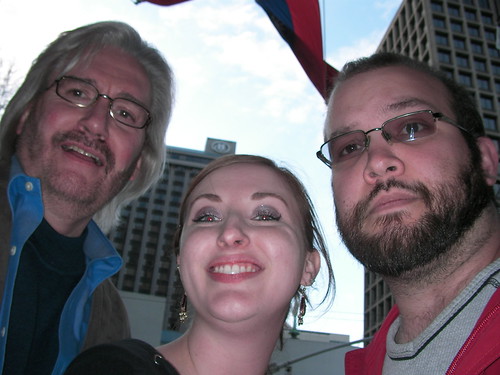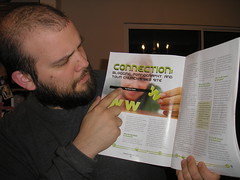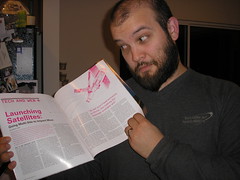- Which is better? To fly in testers or use locals? Either the director or the project manager had to be wrong.
- Why wasn't there communication between the director and the project manager?
- Was the lack of communication a bigger issue with the project?
- Why was the project manager so stern about how bad of an idea it was to fly people in?
- Who was in control of the project: the project manager or the director?
 A Weekend to Remember
The bulk of the weekend was spent attending the Weekend to Remember event put on by FamilyLife. Here we can see Ashley unlocking the secrets of marriage.
[youtube=http://www.youtube.com/watch?v=NC4RlyFqaFM&hl=en&rel=0&color1=0x3a3a3a&color2=0x999999&border=1]
All-in-all the conference was decent, but was skewed more towards sorting out troubles and issues than growing in a healthy relationship. One of the best parts of the weekend is that it presents you with ideas that you're then prompted to discuss with your spouse. This allows you to have conversations you might not otherwise have, or be comfortable bringing up. Ashley and I had some great conversation over the weekend, and the conference was worth it just for that.
The Space Needle
Ashely was all kinds of excited to visit the Space Needle. Lacking proper transportation, however, we got there really early and ended up just walking around the Seattle Center. It was there that we stumbled onto the World Rhythm Festival and got to hear Raquy and the Cavemen.
We ended up eating at Sky City in the Space Needle. The rotating restaurant is powered by 1.5HP, or the equivalent of a sewing machine. It moves you this fast.
And, just to be sure we put things into perspective, the Space Needle is tall.
A Weekend to Remember
The bulk of the weekend was spent attending the Weekend to Remember event put on by FamilyLife. Here we can see Ashley unlocking the secrets of marriage.
[youtube=http://www.youtube.com/watch?v=NC4RlyFqaFM&hl=en&rel=0&color1=0x3a3a3a&color2=0x999999&border=1]
All-in-all the conference was decent, but was skewed more towards sorting out troubles and issues than growing in a healthy relationship. One of the best parts of the weekend is that it presents you with ideas that you're then prompted to discuss with your spouse. This allows you to have conversations you might not otherwise have, or be comfortable bringing up. Ashley and I had some great conversation over the weekend, and the conference was worth it just for that.
The Space Needle
Ashely was all kinds of excited to visit the Space Needle. Lacking proper transportation, however, we got there really early and ended up just walking around the Seattle Center. It was there that we stumbled onto the World Rhythm Festival and got to hear Raquy and the Cavemen.
We ended up eating at Sky City in the Space Needle. The rotating restaurant is powered by 1.5HP, or the equivalent of a sewing machine. It moves you this fast.
And, just to be sure we put things into perspective, the Space Needle is tall.
 The First Starbucks
During the trip to downtown Seattle with Kris and Laura, we got to visit the first ever Starbucks.
The Experience Music Project
We also got to visit the Experience Music Project; basically, and interactive Rock and Roll Hall of Fame for Seattle artists (it also had the Sci-Fi Hall of Fame, which was cool... and random).
At first, I thought I had found my calling on the drums but, alas, the drums were a lie. But then, like a muse calling from the darkness, we found the studio. And we recorded. Oh, did we record.
Leonard Sweet
We also got to meet up with one of my occasional-mentors-who-don't-fully-realize-the-impact-they've-had-on-my-life, Leonard Sweet. I first me Len back in 2001 or so, but this was the first time Ashley got to hang with him. The two definately hit it off, and were ganging up on me on more than one subject
The First Starbucks
During the trip to downtown Seattle with Kris and Laura, we got to visit the first ever Starbucks.
The Experience Music Project
We also got to visit the Experience Music Project; basically, and interactive Rock and Roll Hall of Fame for Seattle artists (it also had the Sci-Fi Hall of Fame, which was cool... and random).
At first, I thought I had found my calling on the drums but, alas, the drums were a lie. But then, like a muse calling from the darkness, we found the studio. And we recorded. Oh, did we record.
Leonard Sweet
We also got to meet up with one of my occasional-mentors-who-don't-fully-realize-the-impact-they've-had-on-my-life, Leonard Sweet. I first me Len back in 2001 or so, but this was the first time Ashley got to hang with him. The two definately hit it off, and were ganging up on me on more than one subject
 Portland and Multnomah Falls
Finally, Kris and Laura drove us to Portland/Vancouver to view their hometown, a big Best Buy, a two-story Target, an Ikea, and Multnomah Falls.
And, I got to steer a building.
Portland and Multnomah Falls
Finally, Kris and Laura drove us to Portland/Vancouver to view their hometown, a big Best Buy, a two-story Target, an Ikea, and Multnomah Falls.
And, I got to steer a building.
 There's More
But it's late, I'm tired, and Leonard Sweet told me blogging was vain anyways. So for more media from our trip:
Flickr Photos
YouTube Videos
and the musical wonder that is, The Spicey Boot.
There's More
But it's late, I'm tired, and Leonard Sweet told me blogging was vain anyways. So for more media from our trip:
Flickr Photos
YouTube Videos
and the musical wonder that is, The Spicey Boot.Somehow, someone put the Sanyo Xacti HD700 sticker on a Sony DCR-DVD308 box.
So I emailed Amazon and, as usual, their customer service is far and above the norm for any company. They offered a full refund (if I shipped it back), as one would expect. The problem came that it was an open box buy, so they couldn't simply send me a replacement order. Instead, I would have to place a new order at full cost.
The full cost of the product from Amazon was still nearly 30% cheaper than Best Buy or Circuit City, so I was going to place the order again... but I emailed them back because one thing bothered me. I had already paid shipping for the order and - because they sent the wrong thing - I'd have to pay shipping again. I emailed them back to see if they could pay for the shipping on the new order.
Their response was that they would give mea refund for the difference between the new product and the open box price! The difference was, obviously, much more than the shipping cost. Amazon Customer Service agents like to go above and beyond whenever they can.
My only dilemma now is that I did have to pay for overnight shipping so that the camera would get here before we left for Seattle. On the principle of the matter, I feel I shouldn't have to pay for the shipping, because it was their fault for shipping the wrong thing. But on the practical level, the discount for giving me the open-box price is more than the cost of the shipping. However, I have now paid shipping twice for one order.
It's an interesting dillema. On a principle level I'm disappointed about paying for the shipping. But, for all intents and purposes, the customer service agent went above and beyond and took care of me at a rate better than simply paying for my shipping.
So, while it would have been best for Amazon to get the order right the first time, I have to say that their response time and the quality of their responses have been above and beyond any interaction I've ever had with a company. Thanks, Amazon, for proving that digital communication can work, and empowering your agents makes for happy(ish) customers!
(And, hopefully, we'll have some great little videos of our trip to Seattle!)
 Gigi's Cupcakes recently opened in downtown Nashville. And yes, I ate one today. And yes, it gave me quite the sugar rush.
Gigi's Cupcakes recently opened in downtown Nashville. And yes, I ate one today. And yes, it gave me quite the sugar rush. I ended up with 34 slides. The final portion - practical examples/stories from my life - never made it to the side bar.
I ended up spending probably 3-4 hours on developing the power point from my notes.
So hours of preparation compress into a 35+ minute sermon, and my thoughts and theology were lifted into the air and communicated to a gathering of supportive friends and loved ones. And, as they say in the story books:
The End.
That's the pain of a pastor, I believe. Your work and soul floats from vocal chords to the present ears, and then you have no control of it. You're done. You know for sure that no one will dote upon the message for nearly the same amount of time you spent preparing it. And so, Monday comes... and you don't know if your child of a message is alive in peoples minds or dead and forgotten.
With messages of the spirit, there's no way of knowing why any response is what it is. It could be a moving of the Holy Spirit, or a hardening of a heart. It could be lack of preparation, or a humanistic talent of charisma and engaging public speaking.
All this to say, teaching/preaching is hard. Let your pastor know when you agree (or disagree) with their message; doing so at least lets them know you processed it a little bit. Hug them when they have a bad day, and blog about it when a message really resonates with you. Pastors put their time, thoughts and theology into messages week after week; they need all the motivation they can get to let their children of words and phrases float on each week, dying on deaf ears or living in our memories.
I ended up with 34 slides. The final portion - practical examples/stories from my life - never made it to the side bar.
I ended up spending probably 3-4 hours on developing the power point from my notes.
So hours of preparation compress into a 35+ minute sermon, and my thoughts and theology were lifted into the air and communicated to a gathering of supportive friends and loved ones. And, as they say in the story books:
The End.
That's the pain of a pastor, I believe. Your work and soul floats from vocal chords to the present ears, and then you have no control of it. You're done. You know for sure that no one will dote upon the message for nearly the same amount of time you spent preparing it. And so, Monday comes... and you don't know if your child of a message is alive in peoples minds or dead and forgotten.
With messages of the spirit, there's no way of knowing why any response is what it is. It could be a moving of the Holy Spirit, or a hardening of a heart. It could be lack of preparation, or a humanistic talent of charisma and engaging public speaking.
All this to say, teaching/preaching is hard. Let your pastor know when you agree (or disagree) with their message; doing so at least lets them know you processed it a little bit. Hug them when they have a bad day, and blog about it when a message really resonates with you. Pastors put their time, thoughts and theology into messages week after week; they need all the motivation they can get to let their children of words and phrases float on each week, dying on deaf ears or living in our memories.

-
Can my spirit handle it?
-
Why would I want to do it?
-
Does it meet a need?
-
Who would lead a study written by me?
-
Who am I to write a study? Or is it pride?


